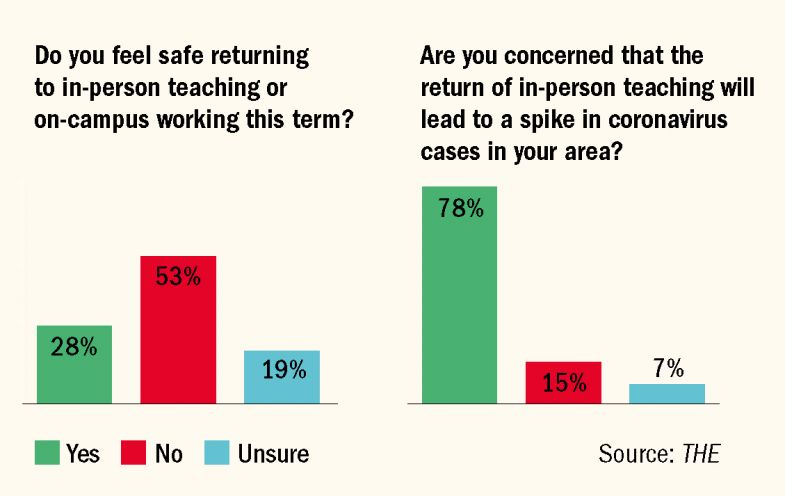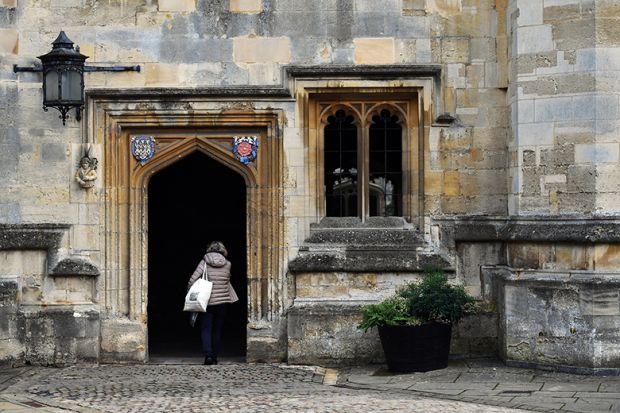Barely one in four staff feel safe returning to campus as universities resume in-person teaching this autumn, according to a global survey conducted by Times Higher Education.
In the poll, completed by 535 academics and higher education professionals, 53 per cent of respondents said that they did not feel safe returning to face-to-face teaching or on-campus working while coronavirus case numbers remained high.
Only 28 per cent of respondents said that they did feel safe, with 19 per cent unsure.
A significant majority of respondents to the survey, which was open between 6 and 13 September, were from the UK. There, with average daily case rates in excess of 30,000 and the average daily death count above 100, universities are promising as much in-person teaching as possible, although many institutions are keeping large-scale lectures online.
In the THE survey, 78 per cent of respondents said they felt that returning to in-person teaching would lead to a spike in coronavirus cases in their area, a scenario that is already playing out on some US campuses where teaching has resumed.

Ninety-six per cent of survey respondents said that they would be fully vaccinated by the time term started, but inoculation rates are typically much lower in younger age groups; in the UK, more than half of 18- to 24-year-olds are yet to have two jabs.
Asked whether they were satisfied with the steps that their university had taken to ensure a safe start to the academic year, 45 per cent were dissatisfied and 24 per cent were unsure. Only 31 per cent were satisfied.
Many UK universities have switched to encouraging the wearing of face coverings on campus, rather than mandating them, and institutions in the country have not followed the lead of some US colleges that have introduced vaccine mandates for students and staff – although these have in turn been forbidden by some Republican governors.
Elizabeth Stokoe, professor of social interaction at Loughborough University, said that “while vaccination rates are excellent, the UK is starting this new academic year with far more cases compared with autumn 2020”.
Professor Stokoe, the author of a report on universities and Covid-19 published this month by the Independent Sage group of scientists, said that there was a “lack of clarity” from the Westminster government on key issues such as phasing term start dates, face coverings and ventilation.
“Staff and students alike should be supported to make choices that keep them physically and psychologically well, such as genuine flexibility and avoiding presenteeism,” said Professor Stokoe.
“Furthermore, as the engine rooms of Covid-19 science and policy advice, universities should be leading the way for other workplaces and educational settings as models of good and safe practice.”
Vice-chancellors have repeatedly said that lecturers are keen to return to face-to-face teaching but this was not overwhelmingly backed up by the survey results, with only 25 per cent of respondents saying they were excited to return to in-person teaching or on-campus working. Forty-three per cent said that they were not excited, with 27 per cent “a little” excited.
However, there were clear signs of a shift towards flexible working in academia, with 62 per cent of respondents saying that their university was offering greater hybrid working options compared with before the pandemic.
The US was an exception to this, with only a quarter of respondents from the country reporting a move in this direction, and this could be a factor in US respondents being more likely to say that they felt unsafe returning to campus, with 68 per cent giving this response. Sixty-two per cent of US respondents were dissatisfied with the steps that their university had taken to keep them safe.
Across all countries, respondents from the 18-34 age group were most likely to be dissatisfied with their university’s preparations for the new term, with 55 per cent unhappy, compared with only 38 per cent of 51- to 64-year-olds.
In comments, many respondents said that a lack of clarity played a big part in their nervousness. “The university hasn’t actually communicated with staff about the measures that are in place,” one wrote. “Lack of transparency on air quality monitoring and ventilation is making me nervous,” another said.
There were some who were keen to get back. “Let’s get back to face to face teaching. It’s what the students want,” one respondent said. But most comments reflected the overall results. “I understand the need to get back to some in-person teaching but I would be hugely more comfortable if the government mandated mask-wearing in all classes and communal areas,” another said.
Many of those who commented felt that the return policy was being “driven by the optics…rather than by the lived experience and concerns of the staff”, as one put it. “‘Back to normal’ has been embraced at all costs to justify the high student fees,” another said.
POSTSCRIPT:
Print headline: Survey: most staff feel unsafe back on campus
Register to continue
Why register?
- Registration is free and only takes a moment
- Once registered, you can read 3 articles a month
- Sign up for our newsletter
Subscribe
Or subscribe for unlimited access to:
- Unlimited access to news, views, insights & reviews
- Digital editions
- Digital access to THE’s university and college rankings analysis
Already registered or a current subscriber? Login








